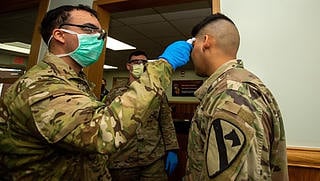Risk-off: bioRxiv study shows J&J vaccine may be less effective against Delta covid variant
|
- Risk-off just got another potential catalyst for the sessions ahead.
- One-shot vaccines are less effective against the Delta and Lambda variants, studies show.
Despite earlier news in the month, as per Johnson & Johnson's website, where the company said in a press release, ''data demonstrated its single-shot COVID-19 vaccine generated strong, persistent activity against the rapidly spreading Delta variant and other highly prevalent SARS-CoV-2 viral variants,'' regrettably, further and more recent studies are proving results to the contrary.
The New York Times has published findings of a new study by bioRxiv posted online on Tuesday that demonstrates that ''the coronavirus vaccine made by Johnson & Johnson is much less effective against the Delta and Lambda variants than against the original virus.''
Abstract
As per the bioRxiv website and study paper,
''the increasing prevalence of SARS-CoV-2 variants has raised concerns regarding possible decreases in vaccine efficacy. Here, neutralizing antibody titers elicited by mRNA-based and an adenoviral vector-based vaccine against variant pseudotyped viruses were compared. BNT162b2 and mRNA-1273-elicited antibodies showed modest neutralization resistance against Beta, Delta, Delta plus and Lambda variants whereas Ad26.COV2.S-elicited antibodies from a significant fraction of vaccinated individuals were of low neutralizing titer (IC50 <50). The data underscore the importance of surveillance for breakthrough infections that result in severe COVID-19 and suggest the benefit of a second immunization following Ad26.COV2.S to increase protection against the variants.''
The NYT wrote, ''although troubling, the findings result from experiments conducted with blood samples in a laboratory, and may not reflect the vaccine’s performance in the real world. But the conclusions add to evidence that the 13 million people inoculated with the J.&J. vaccine may need to receive a second dose — ideally of one of the mRNA vaccines made by Pfizer-BioNTech or Moderna, the authors said.''
Further, the article states that the new study is ''consistent with observations that a single dose of the AstraZeneca vaccine — which has a similar architecture to the J.&J. vaccine — shows only about 33 per cent efficacy against symptomatic disease caused by the Delta variant.''
Market implications
This is likely to be a catalyst for additional risk-off markets for the days ahead and a roadblock for global equities which are attempting to recover from Monday's blood bath.
Investors rationalising that the fears of another crippling round of global lockdowns were potentially overblown may need to think again.
Information on these pages contains forward-looking statements that involve risks and uncertainties. Markets and instruments profiled on this page are for informational purposes only and should not in any way come across as a recommendation to buy or sell in these assets. You should do your own thorough research before making any investment decisions. FXStreet does not in any way guarantee that this information is free from mistakes, errors, or material misstatements. It also does not guarantee that this information is of a timely nature. Investing in Open Markets involves a great deal of risk, including the loss of all or a portion of your investment, as well as emotional distress. All risks, losses and costs associated with investing, including total loss of principal, are your responsibility. The views and opinions expressed in this article are those of the authors and do not necessarily reflect the official policy or position of FXStreet nor its advertisers.